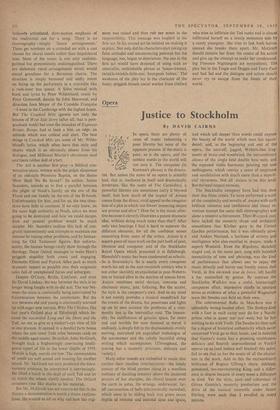Opera
Justice to Stockholm
By DAVID CAIRNS IN opera there are plenty of cases of music redeeming a poor libretto but none of the opposite process. if the music is poor, so is the opera, and the noblest words in the world will not save it. The composer (in Kerman's phrase) is the drama- tist. But unless the score of an opera is actually bad, that is, mediocre in itself and dramatically irrelevant, like the score of The Carmelites, a powerful libretto can sometimes carry it beyond itself. Just how much of the impact of Aniara comes from the direct, vivid appeal to the imagina- tion of a plot in which 'our fevers' menacing shapes are precise and alive'? How far is the music effec- tive because it cleverly illustrates a potent dramatic idea, without doing much more than that? After only two hearings I find it hard to separate the different elements, for all the confident noises emanating from some of the critics. Aniara is a superb piece of team work on the part both of poet, librettist and composer and of the Stockholm Royal Opera which presented it at Edinburgh. Blomdahl's music has been condemned as eclectic. So is Stravinsky's. So is nearly every composer worth his salt in the mid-twentieth century who is not either slavishly straitjacketed in post-Webern- ism or buried alive in the detritus of sonata form. Aniara combines serial devices, concrete and electronic music, jazz, folksong. But the accent, the style is the composer's own. And to my mind it not merely provides a musical soundtrack for the events of the drama, but penetrates and lights up on its own account the problems of a com- munity lost in the interstellar void. The immen- sity, the indifference of galactic space, far more real and terrible for men doomed to travel it endlessly, is deeply felt in the dispassionate, evenly moving, restrained yet anguished monologue of the astronomer and the calmly beautiful string writing which accompanies. (Throughout, the scoring has a masterly precision, delicacy and variety.) Many other moods are embodied in music that catches their timeless reverberations—the lonely ecstasy of the blind poetess rising in a wordless melisma of dazzling intensity above the muttered prayers of her disciples; the choral lament over the earth in ashes, the strange, underwater, far,- off conversation of bells (electronically recorded), which seem to be sliding back into green ocean depths of remoter and remoter time and space, and which toll deeper than words could express the beauty of the world which man has squan- dered; and, at the beginning and end of the opera, the torn-off, jagged, Webern-like frag- ments of brass and woodwind, the extraordinary silence of the single held double bass note, and the repeated violin harmonic petering out into nothingness, which convey a sense of emptiness and annihilation with much more than a superfi- cial cleverness. Not all Aniara is on this level. But the total impact remains.
The Stockholm company have had less than their due from critics. To haye performed a work of the complexity and novelty of Aniara with such brilliant resource and confidence and visual in- vention (except for some dull choreography) was alone a massive achievement. Their Wozzeck may have lacked the masterly shape and orchestral smoothness that Kleiber gave to the Covent Garden performance, but it was vibrantly alive, and Anders Niislund, a baritone of artistry and intelligence who also excelled in Aniara, made a superb Wozzeck. Even the Rigoletto, sketchily staged and, in the name part, sung with hairshirl insensitivity of tone and phrasing, was the kind of performance that allows one to enjoy the music directly and leaves one freshly aware that Verdi, in this six-week tour de force, left hardly a bar untouched by genius. By contrast the Stockholm Walkiire was a stolid, lumberingly competent affair, impressive chiefly in sporting terms as evidence of what a powerful Wagnerian team the Swedes can field on their own.
The controversial BaHo in. Maschera was a splendidly wrong-headed affair. The flunkey-king with a foot in each camp may do for a Nordic prince who is queer nor'-nor'-west, but he has nothing to do with Verdi. The Swedes let their zeal for a degree of historical authenticity which never concerned Verdi go to their heads, and in noticing that Gustav's music has a prancing nimbleness, delicacy and flourish unprecedented in Verdi's operas up to (and indeed well beyond) this point, fail to see that so has the music of all the charac- ters in the work. Add to this the extraordinary brilliance of Ragnar Ulfung's sharp, sidelong, powdered, too-too-twittering King, and a differ- ence in degree became in every sense a difference in kind. Yet the style, pace and coherence of Gtiran Gentele's masterly production and the drive of the musical ensemble under Sixtcn Ehrling were such that 1 revelled in every minute.










































 Previous page
Previous page